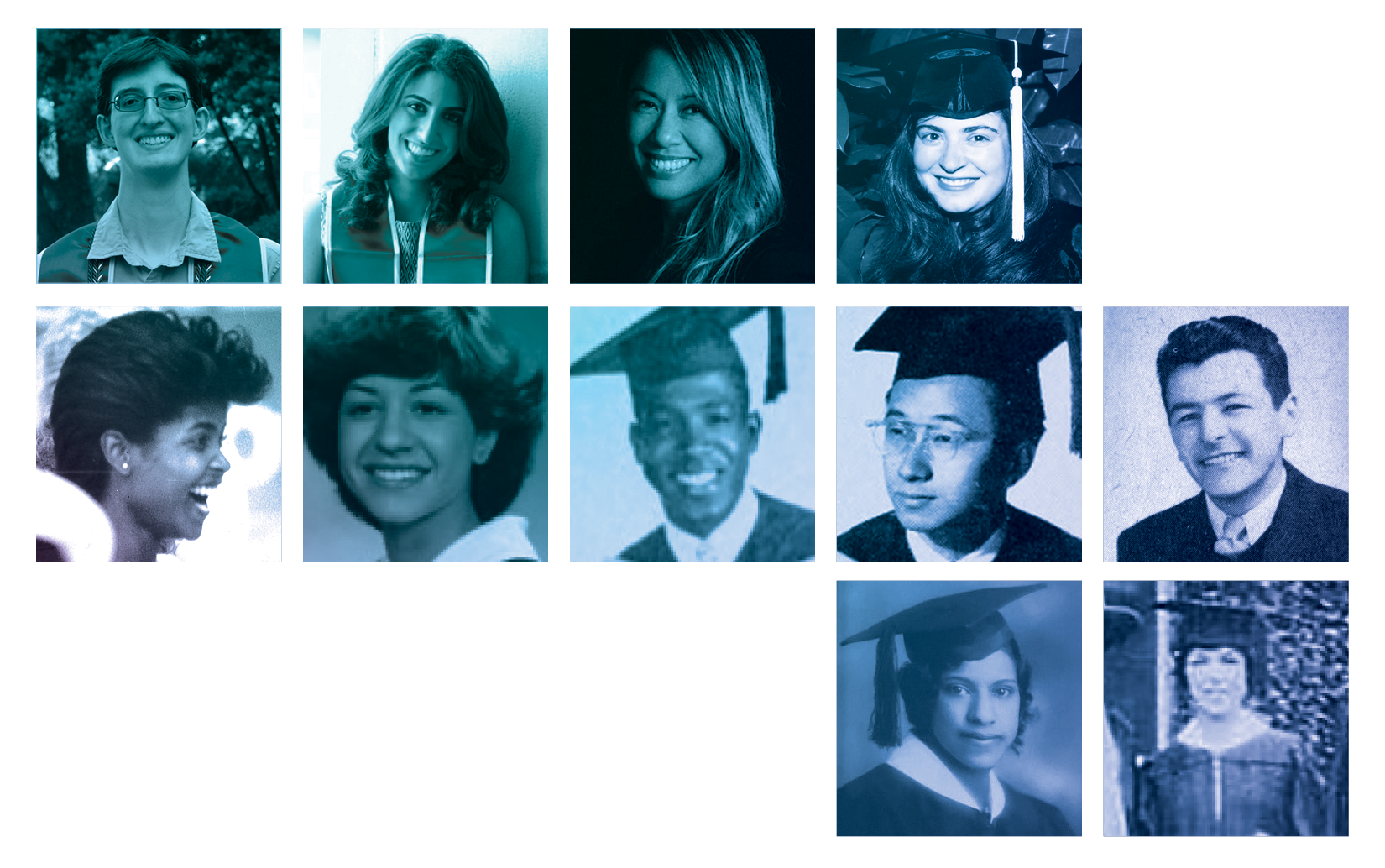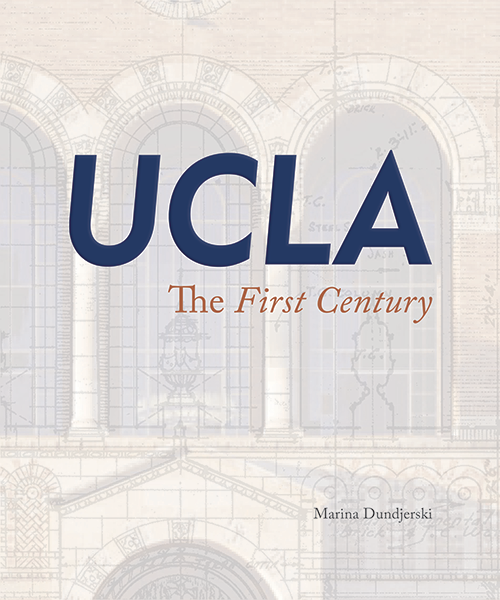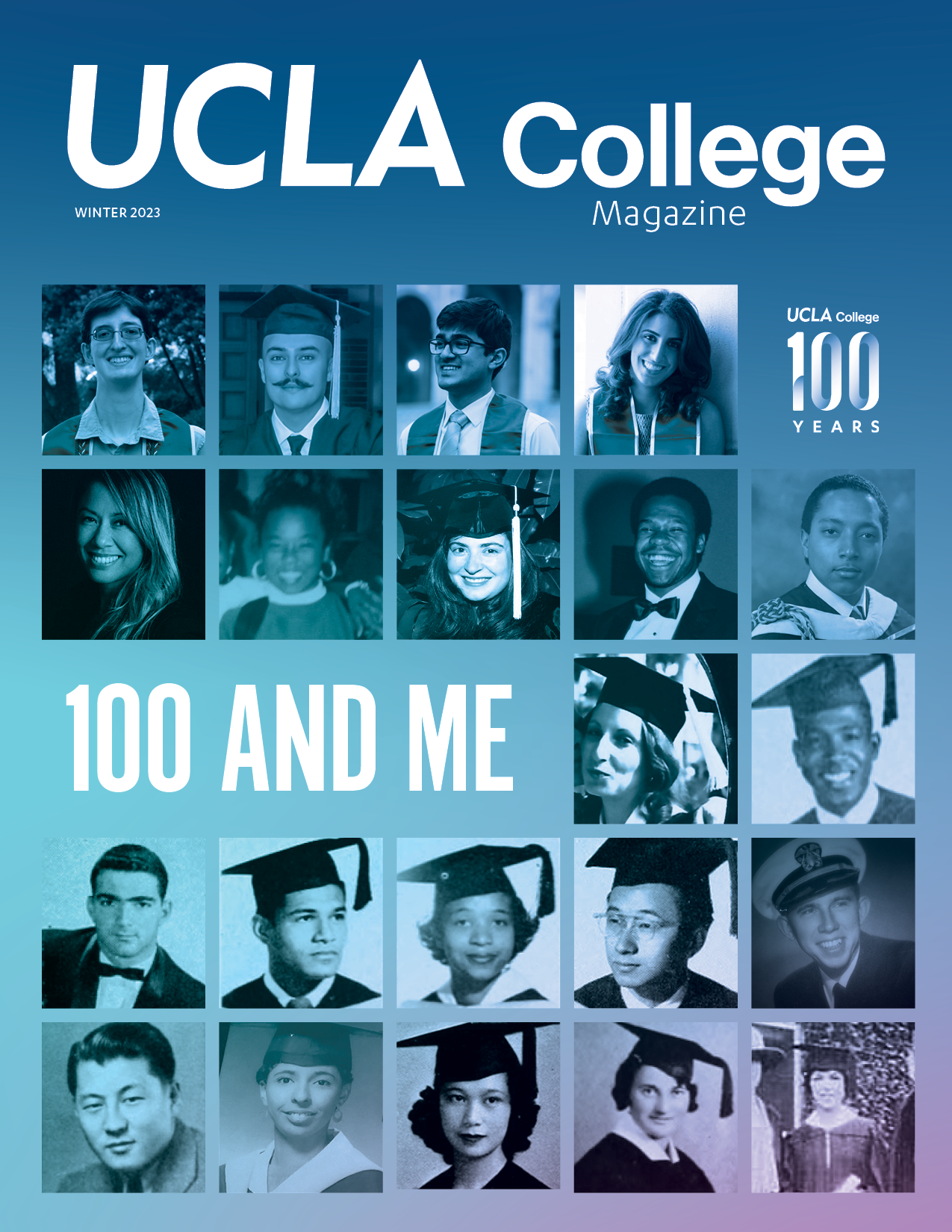With memories spanning decades, majors and interests, graduates of the UCLA College reflect on their time as students and their hopes for the College’s next 100 years. Read their stories below, and click here to share your own.
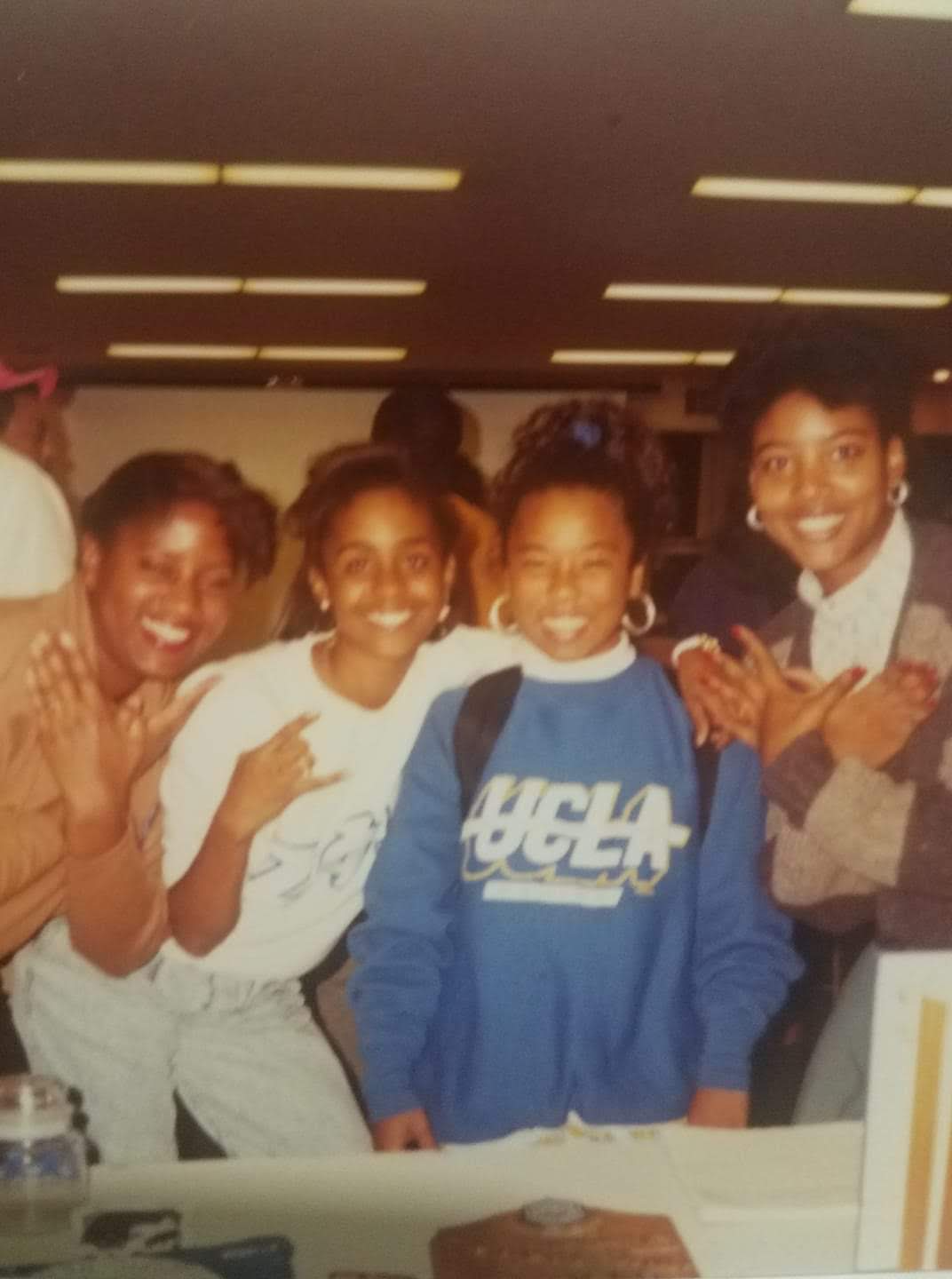
1990s
PAY IT FORWARD
“I like to say ‘teamwork makes the dream work’: you cannot go to UCLA and think you can survive and get through it by yourself. It really does take a village, especially if you’re a Black student or a person of color.”
Thuy Cooper ’94 | History
From the beginning, I knew UCLA was the place for me. My journey started as a high school student visiting campus as part of a college tour and participating in UCLA’s Partnership Program, an outreach program to prepare Los Angeles-area students for college.
Two events sealed the deal for me. First, I remember coming down Bruin Walk and watching students gather in a crowd to hear someone speak. This just awed me, to see free speech at work — it had me thinking: “This is what college life is supposed to be like.” Second, I stayed on campus for the UCLA Partnership Program, where I had the opportunity to experience dorm life and take a course from Professor Oliver, a UCLA sociology professor. UCLA was doing their part to prepare me to be a college student, and that had a meaningful impact on 16-year-old me. And the football and basketball programs were awesome in the late eighties and early nineties — what wasn’t there to love about UCLA!
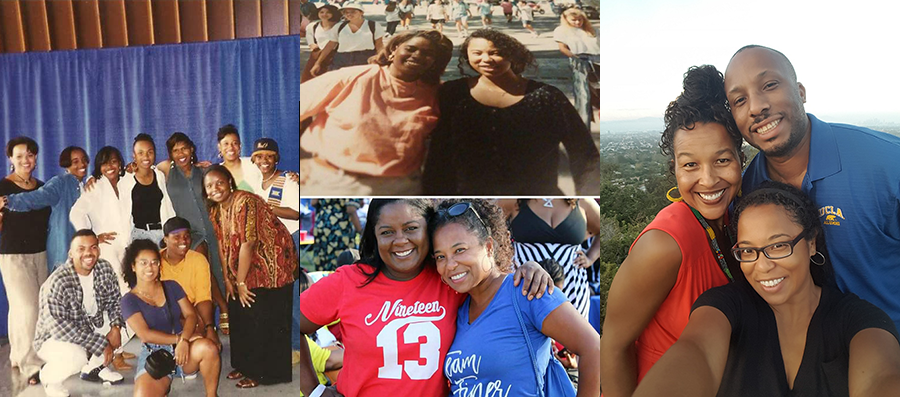
I started college life in August 1989, when I enrolled in the Academic Advancement Program’s Freshman Summer Program. Looking back, the FSP experience was very important and set the tone for my college journey, as I was the first in my family to graduate from a four-year university. During FSP, I not only had the opportunity to take courses that met UCLA’s graduation requirements, but I also received close personal attention from professors, teaching assistants, counselors and peer counselors. FSP prepared me for college life and introduced me to people I’m still in contact with; those of us who attended the program together made deep connections and even established lifelong friendships and relationships. We proudly identify ourselves as “FSP ’89.”
Toward the end of FSP, I suffered the biggest loss in my life, which was the loss of my father. Not many people knew he was ill and hospitalized. It took me forever to speak to him in the past. Anyway, being in FSP and speaking to my FSP counselor helped convince me not to delay my freshman year. Also, my father would have wanted me to stay enrolled. It warms my heart knowing how proud he was that his baby girl was going to UCLA. I am forever grateful for FSP — so much so that I became an FSP counselor myself in summer 1993 to pay it forward. I’m a huge advocate of helping others and paying it forward — I wouldn’t be where I am today if it weren’t for the people who helped me, such as those in the UCLA Partnership Program and FSP.
In a nutshell, being at UCLA as an undergraduate in the 1990s prepared me for the real world. We had so many student-run programs that taught us how to be strategic, how to run organizations, how to work with other people — all skillsets that I still use today. While I didn’t take advantage of everything UCLA had to offer, I took part in activities that help shape me into the person I am. I was involved in UniCamp, the Afrikan Student Union and Nommo, the Black student publication. I spent a lot of time in the Men’s Gym — today it’s the Student Activities Center — and the Community Programs Office (CPO), where I took advantage of the peer counseling offered by the Academic Supports Program and learned so much about consciousness from Tim Ngubeni. I helped organized Azania Solidarity Day to celebrate South Africa; I took advantage of tutoring services offered by the Academic Advancement Program in Campbell Hall. I joined Zeta Phi Beta Sorority, Inc., a historically Black sorority — I’m still active 30 years later, and have maintained close connections with my sisters from that time.
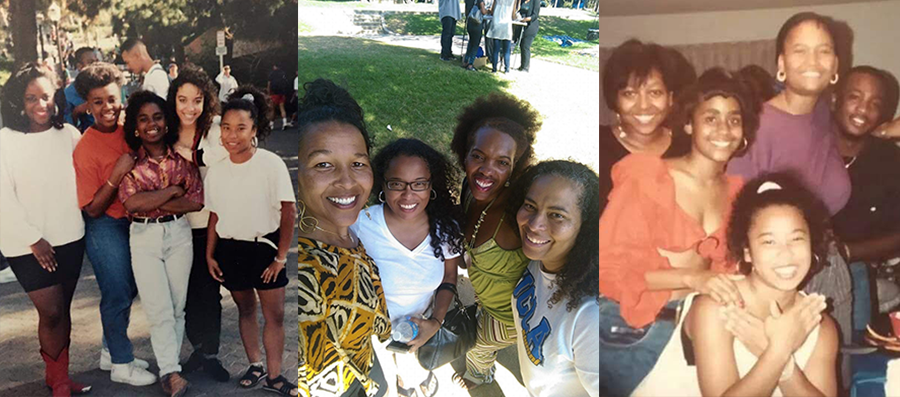
I truly have fond memories of UCLA. I remember one day, walking from class on north campus with my best friend, stopping in the quad in front of Royce Hall and Powell Library and just looking around. And I said, “Can you believe we’re right here at UCLA? We’re students at UCLA.” There’s something special about that campus. I don’t care how long I’ve been gone, every time I set foot on that campus, it brings back so many memories, and it makes me feel blessed and fortunate that I was able to experience my college years as a Bruin.
We had a strong Black population at UCLA in the early nineties. There are those who say that to have a true Black college experience, you must attend a Historically Black College/University. I beg to differ based on my experience. Looking back, I didn’t feel the need to go to an HBCU for undergrad because we had such a strong community at UCLA. We had what we called Black Wednesday: every Wednesday between noon and one o’clock, the Black students gathered at the bear. You would see your different pockets: athletes, sororities and fraternities, or just regular people hanging out. That’s where you saw the Black culture on campus. Black Wednesday was so popular that even Black students from nearby universities would come to campus to join in socializing. (By the way, I attended Clark Atlanta University, an HBCU, for graduate school, and I appreciated my experience, but it’s no UCLA!)
I loved taking advantage of the varied programming at UCLA. We had Mardi Gras, had a few protests that I participated in, and had some of the greatest guest speakers: I saw Cornell West and would get excited each time Kwame Ture (formerly Stokely Carmichael) spoke on campus. I was in awe to be in the presence of a former Black Panther Party member. Every time there was an opportunity to listen to individuals who were part of the Civil Rights Movement or the Black Power Movement, I was all about it.
I think my favorite class had to be “Ellingtonia,” the class on Duke Ellington with Kenny Burrell, a famous jazz musician in his own right. It was amazing having professors like him who were passionate and cared about the topic. And as a history major, I loved any class on U.S. history. I enjoyed doing the research — I took one course where I was able to identify the topic I wanted to explore, and mine was a comparison of the Black Power Movement and the Vietnamese nationalist movement; it tied both my cultures together. My goal was to turn that paper into a dissertation for my Ph.D., and that didn’t happen. But the funny thing is, I still have that paper today, because I was so proud and it was so important to me.
I had the best roommate freshman year. Shelly was a transfer student from Sacramento — oh, the stories we shared as roomies, including her experience as a Tri-Delt and those wild stories from Frat Row. At the end of the year, we created a list of the top 100 things that happened to us our first year in college, and I still have that list! She and I are close to this day, and we still laugh at the things that happened to us while we were living together.
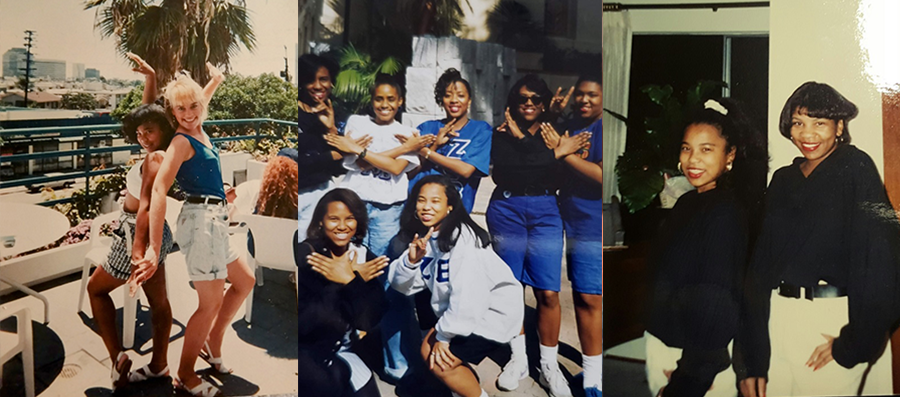
Today, I’m heavily involved with the UCLA Black Alumni Association, and I support my undergraduate sorority sisters when they have events. I like to say “teamwork makes the dream work”: you cannot go to UCLA and think you can survive and get through it by yourself. It really does take a village, especially if you’re a Black student or a person of color. We can’t do it on our own, and we have to recognize that, and then when we do make it, and we see that light — pay it forward, because there’s someone behind you that needs that same help, that thinks no one has ever gone through the same thing they’re going through.
Just last month I spoke at Black Convocation, representing the UCLA Black Alumni Association, and one of the things I said is: Tap into not only the faculty on campus, but also to Black alumni. Because the things that students are going through, we’ve gone through them; we’ve experienced a lot of that already. And if we don’t know the answer, we can probably find someone who can help them. So that’s what I want my UCLA legacy to be: teamwork makes the dream work, and pay it forward. And I think that’s what UCLA is really all about. That’s the spirit of UCLA — wanting to learn and making a difference — and I’m really happy that I’m a part of that legacy.
In the next 100 years, I hope we continue to build on our current legacy — that we continue to welcome people with diverse ideas and viewpoints, and to value those viewpoints. I hope to see us expand a little bit more with satellite campuses, and create an environment where students from low-income families have an opportunity to go to UCLA and learn and be able to contribute to society. I don’t think money should be an obstacle for someone who wants to go to school and get their education.
I would love to see a day where we have a Black chancellor, or a woman chancellor. I believe we’ll get the most qualified candidate to succeed Chancellor Block. But to me, why not one who is a woman, a Black woman or a person of color? Chancellor Block has been awesome in increasing diversity and making us a real, true, community-based university, and I hope anyone that comes in after him continues that legacy.
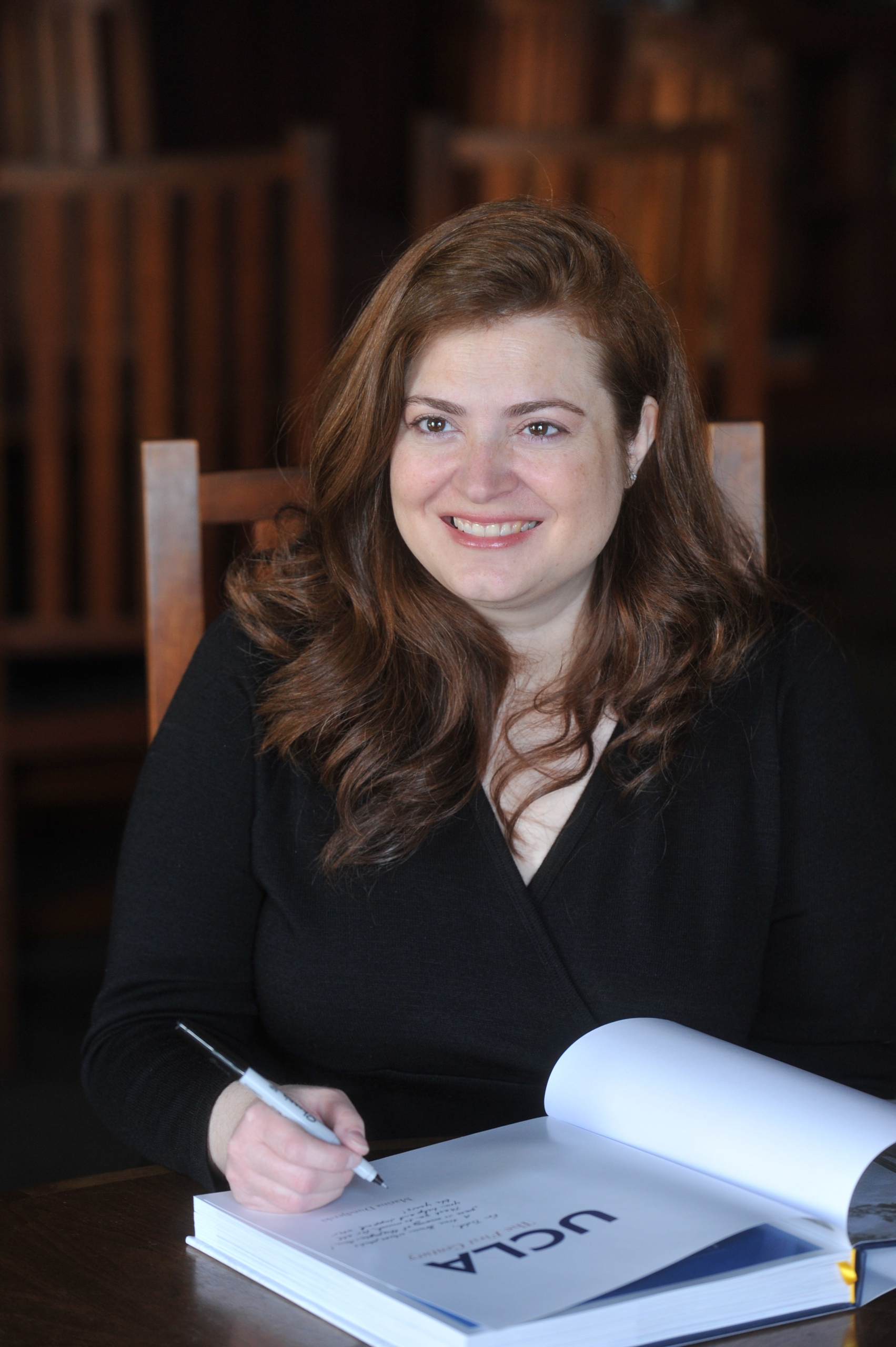
Write the Book
“I’m proud to help mark the 100th anniversary of the UCLA College, which shaped countless Bruins in our formative years, paving the path ahead. Congratulations!”
Marina Dundjerski ’94 | English
During orientation, we were led on a four-hour campus walking tour and regaled with campus lore (like how Bunche Hall was rotated after its waffle windows blinded motorists on the 405). Of course, I believed it all. We were then “initiated” by wading into the Inverted Fountain. While we were enjoying the moment on that scorching day, some students came by and grabbed all our shoes and ran off. We found them a short distance away in a huge mound. We laughed so much as we sorted out our footwear. I entered UCLA as undeclared in the humanities, and while UCLA was a vast and challenging place, I knew right then that it would also be fun to navigate my way through.
There’s always so much happening at UCLA. In 1993, I was able to see Sir Ian McKellen in “King Richard III” in Royce Hall — what a way to see Shakespeare come to life, especially for an English major. Another memory: One of my professors had a tie to noted philosopher Jacques Derrida and arranged a field trip via carpool to hear the founder of deconstructionism give a keynote lecture at UC Irvine. What a rare opportunity that was. Finally, my grad year coincided with UCLA’s 75th anniversary in 1994, marked with a celebratory academic convocation in Pauley Pavilion. There was a video — which may have been my first real introduction to UCLA’s history — and then the sitting U.S. president, Bill Clinton, addressed us Gen-X Bruins as a “generation of seekers” and America’s future. That was certainly memorable.
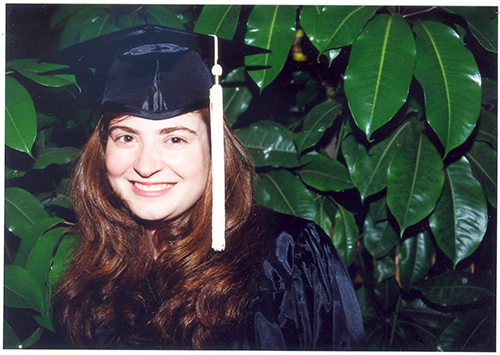
“Just after the College of Letters & Science humanities commencement in the LATC, 1994.”
My favorite classes were the musicology 135 series: history of opera. I took all three elective classes, covering the Baroque period through Philip Glass. It was my final year and the course was three days a week including a Friday 8 a.m. discussion session — that should underscore just how much I loved it! I remember going to the cheery yellow Towell Library after the Northridge earthquake to listen to operas held on reserve for the class. It was a different form of storytelling that complemented the English major perfectly.
My favorite place on campus was the Daily Bruin offices in Kerckhoff Hall. I spent so much time there and have great memories of the camaraderie and our shared sense of responsibility and pride in putting out a newspaper covering campus.
At the time, UCLA offered a specialization in world literature. It meant studying the global greats — from Cervantes to Dostoevsky, Shakespeare to Ibsen, and Confucius to Gwendolyn Brooks — and required taking some classes with the lectures and literary text in the original language. I chose Literatura Hispanoamericana. No matter how good a translator/editor is, some things are simply lost in translation. For example, metaphors in poetry. Reading and discussing the original texts in Spanish, and comparing them with their English versions, offered another dimension to learning, with the added benefit of social and cultural context.
As an alumna, I feel privileged to have been able to write the book “UCLA: The First Century.” After graduating, it seemed that my work as a journalist always kept me writing about UCLA in one way or another. As I said when the book first came out, I am inspired by the story of UCLA and I see its history as a collective, living legacy that we all share.
Working on the book, I enjoyed spending time with UCLA’s Pioneer Bruins. Their love and joy in talking about UCLA felt almost unmatched and was quite contagious. Pioneers were part of the group that moved from the old Vermont Avenue campus to UCLA’s new Westwood site and felt an ownership based on their advocacy for the university’s permanent location. Interviewing Coach Wooden in his Encino home was also a memorable experience. He emphasized that he considered himself a teacher first, and true to that he took moments during our conversation to teach me something or two — from basketball to life. He was so kind. Unforgettable.
Thinking about what makes UCLA so special, there is one central, underlying theme: UCLA was built on risk. The chances, decisions, opportunities that campus leaders — including administrators, faculty, students and alumni — took over the years forged UCLA into what it is today: the top-ranked U.S. public university. From overcoming stiff political opposition to establish the institution in its own right in 1919 to pursuing scientific advances such as leading the search to treat and cure HIV/AIDS, UCLA’s leaders have always moved the campus forward not just through sheer determination, but with optimism. I hope that will always continue to be a hallmark of UCLA’s legacy.
Looking back on UCLA’s history, I think it’s important for everyone to know that UCLA wasn’t shaped just by administrators and faculty; students, alumni and community members also played a significant role in building the institution over the years. One historical anecdote illustrating this involves the advocacy to pass an L.A. bond measure raising funds for the Westwood site. Hollywood entrepreneur William Fox created a short propaganda film that was shown in movie theaters, and local high schoolers, coached by UCLA collegians, made live pitches urging a Yes vote on the proposition, which voters ultimately approved by about a 3-1 margin. This was just one effort in a mass campaign to pass a series of public funding bonds — and students, alumni and community members had a tremendous part in making that happen.
I’m proud to help mark the 100th anniversary of the UCLA College, which shaped countless Bruins in our formative years, paving the path ahead. Congratulations!
Special thanks to the UCLA Alumni Association and UCLA Alumni Diversity Programs & Initiatives.
Visit them to further explore the UCLA College community.
![]()
Los Angeles, CA 90095


